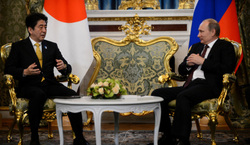 Source: afp.com
Source: afp.com Once it became evident that Australia had lost a considerable number of citizens in the incident (28 citizens, with another 9 non-citizen residents, bringing Australia’s total loss to 37), the Abbott government lost no time in pointing the finger at pro-Russian forces in eastern Ukraine*, mentioning them in a statement delivered to Parliament on Friday last week and referring to the incident as a crime. With the loss of Australian lives and no-one admitting culpability in bringing the aircraft down, the Abbott government decided to name Russian President Vladimir Putin as the one person who could both convince the armed groups in eastern Ukraine to allow inspectors to visit the crash site and secure proper treatment of the remains. Moreover, Australia was in no mood to delve into semantics with Russia over who was or wasn’t responsible for the incident, quickly moving a resolution in the UN Security Council for a full investigation into the incident and proper treatment of the remains of the victims.
In terms of Japan’s reaction, Foreign Minister Kishida stated on Friday evening that Japan had offered its condolences to those countries whose citizens had been lost in the incident, and that it had called on all countries related to the incident to co-operate in any initiative that might be launched in relation to MH17 (J). Japan, for its part, would offer whatever assistance necessary.
While Japan has no direct stake in the investigation, it did take a stance against Russia at the G7 leaders meeting in Brussels in June, expressing Japan’s support for the Ukrainian government of President Petro Poroshenko and calling on Russia to co-operate in a constructive way to resolve the crisis in eastern Ukraine (J).
This action was reported at the time as being particularly courageous of PM Abe, given that his government was in negotiations with Putin at the time for talks to begin on the transfer of the Sakhalin Islands back to Japanese sovereignty, the signing of a formal treaty ending WWII hostilities between Russia and Japan, and discussing Russian gas exports to Japan. Clearly the Abe government came to same conclusion as many other countries in the vicinity of Russia – that trust of the Putin government could only be taken so far, and that it was better to side with other democracies in their condemnation of Russia’s behaviour than to continue with a perceived neutrality towards an enigmatic government with a history of ignoring international protocols and which is growing ever closer to China.
Nonetheless, as this particular interview indicates (J), the Abe government still hopes to create a dialogue with Putin over the northern territories question and is still planning to host Putin in a visit to Japan in or around September or October. If Putin agrees to the international investigation of the cause of the crash of MH17, and is able to convince the pro-separatist forces in eastern Ukraine not to interfere with the investigation, then he may gain enough credit in Japan’s eyes for further dialogue to continue.
The US, however, would be less than enthusiastic for Japan to make any concessions to Putin at this stage, especially as it is attempting to convince the international community that Putin aims to destabilise the order that has kept a relative peace in Europe since the end of the Cold War. Abe may go his own way in relations with Russia as he has previously overlooked US objections to his own nationalistic bent, but given the emphasis Abe has placed on America’s importance to Japan’s security environment, particularly in relation to China, for Abe to suddenly disregard Washington’s concerns would not go down well inside the Beltway.
*Canada’s Foreign Minister John Baird was even more blunt about who was responsible for the incident, saying “The Kremlin may not have pulled the trigger but it certainly loaded the gun and put it in the murderers’ hands”.
 RSS Feed
RSS Feed